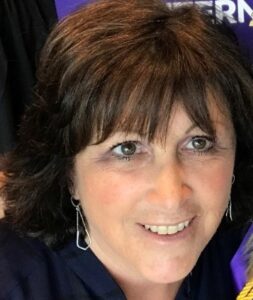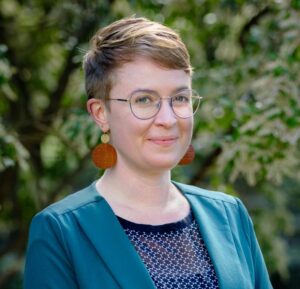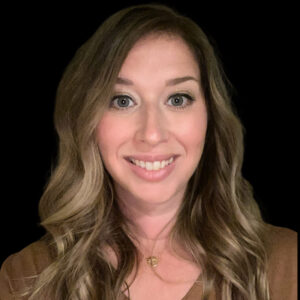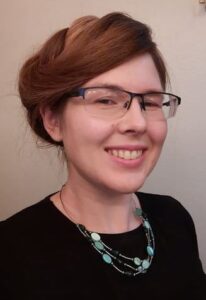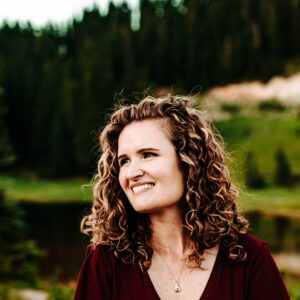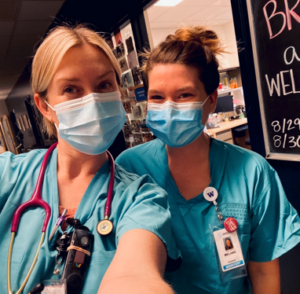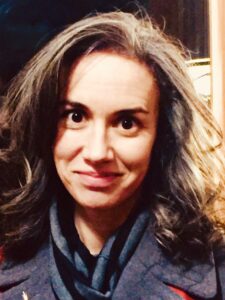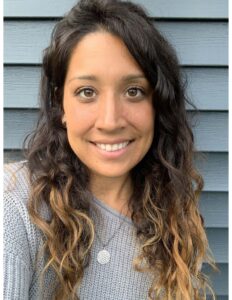Meet Some of Our 2022 Doctor of Nursing Practice Graduates
Today, our class of 2022 Doctor of Nursing Practice students presented their final projects. Read messages for the graduating class by school leadership and DNP track leads here, and meet some of our incredible 2022 graduates below:
Megan Bianco
Degree: Doctor of Nursing Practice ’22 Track: Pediatric Acute Care Track
Project Title: The Implementation of an Alternative Method for Clean Catch Urine Sample in the Non-Toilet Trained Patients
What was your final project? How did your project make an impact on you? Did it change your view of the role that nurses play in our communities?
I worked with Seattle Children’s Hospital Emergency Department to implement a new non-invasive bladder stimulation technique to collect use samples in non-toilet trained patients. This pilot study evaluated the effectiveness of the technique and recommendations for a larger implementation.
A nurse in the ED recognized the high number of catheterized samples in the department and the discomfort for the infants. She escalated this area for quality improvement that eventually led to my project! Nurses have a strong voice for QI in the community and can dramatically improve care on both the individual and community level.
Working through a quality improvement project has instilled in me the importance of team work. Involving all members of the care teach (nurses, technicians, providers, etc.) is essential for effective implementation. In future projects I will use this concept to gain insight from a variety of perspectives.
Arezu Piroozmandi
Degree: Doctor of Nursing Practice ’22 Track: Psychiatric Mental Health Nurse Practitioner (PMHNP)
Project Title: Hospital Wide Training for Ground & Reset Among Inpatient Staff at Seattle Children’s Hospital.
What was your final project? How did your project make an impact on you? Did it change your view of the role that nurses play in our communities?
My final project was to design, pilot test & implement a brief, just-in-time training on a revamped in-the-moment staff support intervention. Ground & Reset is an intervention that provides resources for employees to cope in the moment with particularly emotionally distressing scenarios on their shift. This project had a positive impact on my growth with leadership skills and as an advanced practitioner. Evidence shed light on the critical, ongoing problem of burnout amongst nurses. Findings indicated that stress & burnout are negatively associated with resilience. More attention needs to be put towards job resources and social support to promote a positive work environment, culture and mitigate burn out amongst nurses and healthcare staff.
Audrey L. Covner
Degree: Doctor of Nursing Practice ’22 Track: Population Health Systems and Leadership
Project Title: Creating Evidence Driven Practices to Guide Seattle Veterinary Outreach as it Collaborates with Human Service Providers to Address the Physical and Mental Health Needs of Unhoused Pet Owners
What was your final project? How did your project make an impact on you? Did it change your view of the role that nurses play in our communities?
Despite consistent data suggesting the importance of a pet to those who are housing vulnerable and/or low-income, significant barriers exist with respect to finding ways to exit homelessness or obtaining needed human care services. Most shelters or emergency housing facilities as well as health care providers have no-pet policies. Leaving pets unattended to seek human care is not a viable option for pet owners who worry about the safety of their animal. Refusing to leave their animals unattended, pet owners chose to forego their own health, often saying “pet before self”. Seattle Veterinary Outreach (SVO), a nonprofit organization that provides free veterinary services to this vulnerable population, uses the trusting relationship it creates with pet owners to guide people toward services to improve their own health and wellbeing. Partnering with human care service providers that join SVO at its mobile sites, people are met with pet-friendly opportunities. As a young organization, SVO was in need of establishing some evidence-based models to support their work. Therefore, the purpose of this Doctor of Nursing Practice (DNP) project was to guide SVO through a process to review and revise its mission and vision statements, to analyze SVO human needs assessment data and create a partnership ranking system that included review of its own data, funding opportunities, and logistics related to set up partnerships. Using this ranking system, potential human care service partners were identified. In addition, the project identified potential advocacy opportunities aimed at reducing barriers for unhoused pet owners, activities in which SVO could participate.
The impact of doing this project was in understanding how important using data to make decisions is particularly when the organization is young and seeking funding sources. Being able to include evidence-driven information in grant proposals or in philanthropic efforts creates credibility for the organization. In addition, engaging with SVO and performing a literature search on the impact of animals on those who are unhoused opened my eyes about the number of barriers facing pet owners trying to get help for themselves. The positive influence animals have on this population is key to understanding how to address their needs. The importance of this for nursing is the understanding that people need to be met where they are and that “family” means something different to everyone; instead of creating barriers for pet owners, we can foster new ways of providing care that allows this group a chance to address their own physical and mental health needs without having to give up their “family”, their pet.
Samrawit Zeinu
Degree: Doctor of Nursing Practice ’22 Track: Adult-Gerontology Primary Care
Project Title: Development of Patient Education Materials for Lifestyle Changes in Nonalcoholic Fatty Liver Disease
What was your final project? How did your project make an impact on you? Did it change your view of the role that nurses play in our communities?
My final project involved putting together educational materials for patients with nonalcoholic fatty liver disease at the Harborview Medical Center Liver Clinic. I met with the providers and a dietitian at the clinic to identify patient needs and adopted existing evidence-based educational materials, including diet and physical activity guides and local and national resources. The clinic serves a racially/ethnically and socioeconomically diverse population. This project provided me with an opportunity to understand better the needs of disadvantaged populations related to patient education on lifestyle changes. Through piloting the materials, I evaluated patient perceptions and their effect on behavior changes. This experience highlighted the impact advanced practice nurses can make in supporting their patients to make healthier lifestyle choices by identifying and addressing barriers.
Kari Lombard
Degree: Doctor of Nursing Practice ’22 Track: Psychiatric-Mental Health Nurse Practitioner Track
Project Title: Provision of Mental Health Services Through School-Based Health Centers
What was your final project? How did your project make an impact on you? Did it change your view of the role that nurses play in our communities?
The purpose of my DNP capstone was to address existing gaps in adolescent mental health care by developing a proposal for a psychiatric-mental health nurse practitioner (PMHNP) role within Seattle Public School-Based Health Centers. As a high school nurse, I saw how the lack of accessible psychiatric care for teens continuously harmed our students who were struggling the most. Through creating this PMHNP role proposal, I have learned a great deal about the profession I’m entering, including how nurse practitioners can be integrated into multidisciplinary teams as leaders, advocates, and innovators. I am so grateful to the many experts and leaders in school-based health who contributed to this project. Every step of the way, I encountered professionals who care deeply and sincerely about adolescent mental health. Their enthusiasm and thoughtfulness were contagious as we engaged in conversations about redefining school-based mental health care. I hope that we can continue to collaborate in the future!
Lauren Jensen
Degree: Doctor of Nursing Practice ’22 Track: Psychiatric-Mental Health Nurse Practitioner Track
Project Title: The Screening and Care of Patients Experiencing Commercial, Sexual Exploitation in the Rural Emergency Department Setting
What was your final project? How did your project make an impact on you? Did it change your view of the role that nurses play in our communities?
My doctoral dissertation (title above) is my final project. I completed my project in the rural ER I have been working in for the last 6 years and it has meant a lot to me to bring evidence-based interventions and care to assist this vulnerable patient population. I am happy to translate such important research into practice for the same community I grew up in. I may be biased but, nurses play a key role in our communities which means we need to do more to connect patients experiencing sex trafficking to trauma-informed care and resources.
Marites Almachar
Degree: Doctor of Nursing Practice ’22 Track: Adult-Gerontology Acute Care Nurse Practitioner Track
Project Title: Extracorporeal Membrane Oxygenation (ECMO) Specialist Staffing Optimization
What was your final project? How did your project make an impact on you? Did it change your view of the role that nurses play in our communities?
Extracorporeal membrane oxygenation (ECMO) is prolonged cardiopulmonary support used in intensive care units (ICU). At the University of Washington Medical Center (UWMC), ECMO specialists are trained staff who manage the ECMO pump and are experienced ICU registered nurses (RN) or respiratory therapists (RT). With the increasing demand for ECMO support for patients, especially during the COVID-19 pandemic and the expansion of the ECMO program in the near future, the ECMO program seeks to make more efficient use of its pool of bedside ECMO staff while maintaining high standards of patient care and safety. The purpose of this Doctor of Nursing Practice (DNP) project was to recommend revisions of the ECMO program’s staffing algorithm based on published literature and surveys of ECMO specialists at UWMC and other ECMO centers around the United States.
As a former ICU nurse taking care of patients on ECMO, I felt a great sense of pride and honor knowing that the results of my project would help inform and guide the UWMC’s ECMO specialist staffing revisions and aid other ECMO centers around the country in optimizing their ECMO specialist staffing structures.
Nurses are incredibly versatile, and their knowledge and skills allow them to be trained in various roles. As ECMO specialists, nurses function at the top of their scope of practice. They save lives by managing lifesaving equipment while providing patient-centered care to patients requiring ECMO support.
Katie Ahlstrom
Degree: Doctor of Nursing Practice ’22 Track: Nurse Midwifery Track
Project Title: Re-Envisioning Care For the 35-Week Infant
What was your final project? How did your project make an impact on you? Did it change your view of the role that nurses play in our communities?
The purpose of my Doctor of Nursing Practice project was to evaluate and recommend care revisions to support rooming-in for late preterm infants born between 35 0/7- 35 6/7-week gestation. The agency I worked with routinely admits all infants under 36 weeks of gestation to the NICU for prematurity, resulting in family separation. I worked with a multidisciplinary team to perform a needs assessment at the agency, provide education to staff, and create a protocol for triage and assessment of the 35-week infant, wherein stable infants could remain with their birthing parent.
I was honored to participate in this project. Some research suggested that families that experience separation due to NICU admission have poorer family functioning years down the road. This project was the first step in reimagining care for preterm infants and considering the birthing parent and the infant as a patient dyad regardless of gestational age.
Nursing is a broad and fantastic field. This project served as a reminder that nurses have an incredible ability to impact change. Incorporating best evidence for families and patients into practice change is just one of the many rewards of nursing.
Holly Brezynski
Degree: Doctor of Nursing Practice ’22 Track: Psychiatric Mental Health Nurse Practitioner (PMHNP) Track
Project Title: Hospital Discharge Practices Leading to Readmission of People Living with Dementia in Washington State
What was your final project? How did your project make an impact on you? Did it change your view of the role that nurses play in our communities?
My DNP project identified hospital discharge transition practices leading to higher readmission rates for people living with dementia in Washington State by interviewing hospital and outpatient healthcare workers.
My DNP project had a significant impact on me because of what I found: disheartening systemic barriers facing people living with dementia and those wholeheartedly dedicated to finding solutions. I was honored to connect with so many people genuinely committed to helping some of our most vulnerable community members. I hope my project, which summarizes their experiences, will help improve the lives of people living with dementia in some small way. The drive, empathy, compassion, and hope that went into this project are truly why I am proud to be in healthcare.
My DNP project emphasized the critical roles nurses hold in the success of dementia patients and their care partners as they transition through our healthcare system. Nurses are at the forefront of hospital and outpatient care settings advocating, educating, and coordinating the interdisciplinary care necessary for the success of people living with dementia to stay in the community after a hospital discharge.
Lauren Haehnel
Degree: Doctor of Nursing Practice ’22 Track: DNP-FNP track
Project Title: Reducing Health Disparities in the Inpatient Population
What was your final project? How did your project make an impact on you? Did it change your view of the role that nurses play in our communities?
The purpose of my DNP project was to design, implement, and audit a new workflow to capture race and ethnicity data as it plays into the larger context of social determinants of health (SDOH) on infants during the labor and delivery admission at my organization. This was driven by a realization that newborns were being marked as “unknown” for race ethnicity 50% of the time consistently up until 13 years old. Further, unexpected birth outcomes were disproportionately stratified among minorities and “unknown” race and ethnicity. An organization cannot begin to make meaningful changes towards health equity if they do not know their current health outcomes.
Throughout successful implementation and collaboration with my organization I realized the platform we have as DNP prepared providers. Our training lends itself to more impactful changes to better serve our patients. The combination of a health practice degree paired with leadership, evidence translation, and implementation sciences really increases our yield as providers. Lastly, I learned how small changes in data collection can have lasting impacts.
Lauren Carfley Karcher
Degree: Doctor of Nursing Practice ’22 Track: Family Nurse Practitioner
Project Title: Implementation Science to Transform Clinician Communication Skills Training for Serious Illness
What was your final project? How did your project make an impact on you? Did it change your view of the role that nurses play in our communities?
Through a partnership with a large healthcare delivery system in North Central Washington, I developed recommendations informed by implementation science to transform and accelerate the adoption of a system-wide communication skills training program for ARNPs, PAs, and physicians.
Early in the DNP program, I experienced first-hand the variation that exists in skilled clinician communication when faced with serious illness in my child. As a mother and nurse, I gained perspective that only comes with sitting on the other side of such critical conversations. Knowing that my lived experience, augmented with the latest scientific evidence, proven frameworks, systems leadership, and advanced nursing practice, will improve the way clinicians communicate serious news and respond to emotion feels awe-inspiring and brings tremendous meaning to my life’s work in nursing.
Nursing practice is underpinned by our holistic care philosophy, intuition, and deep understanding of the patient perspective. My DNP work bolstered my view that combining the translation of science with nursing’s care philosophy and expertise makes nurses uniquely well-positioned in the transformation of policy, practice, and systems of care.
Dianne Manansala
Degree: Doctor of Nursing Practice ’22 Track: Pediatric Nurse Practitioner – Primary Care
Project Title: Enhancing Cultural Sensitivity in First Steps
What was your final project? How did your project make an impact on you? Did it change your view of the role that nurses play in our communities?
I created a language translation model to help revise and translate the First Steps classes at Seattle Children’s Autism Center (SCAC). First Steps are classes offered to parents/caregivers of newly diagnosed patients at SCAC. The classes are in the process of being translated in Vietnamese so I focused on linguistic and cultural considerations for the translation of the content for this patient population. These classes are also in the process of changing its format to short educational videos so I also looked into that.
I have gained all this knowledge about current processes of language translations and cultural aspects that can easily be overlooked in autism care. There is often stigma regarding autism and parental blame. Translated words for autism often also aligns with a negative connotation. It is important to think about how cultural beliefs and/or perspectives, on top of properly delivering the translated content. Resources are also a big part of autism care. I have realized that there is definitely a need for increasing autism care resources specifically made for certain cultures, such as Vietnamese.
It strengthened my view on how nurses are great advocates for their patients. Nurses are great at developing patient and family rapport. I think part of that is also understanding the patient and their family’s cultural views and perspectives. This understanding and trusting relationship can be an effective way of effectively educating patients and their families to help achieve positive health outcomes.
Melanie Haak
Degree: Doctor of Nursing Practice ’22 Track: Nurse-Midwifery
Project Title: Assessment of Provider Knowledge on Optimizing Vaginal Health
What was your final project? How did your project make an impact on you?
For my DNP Project, I worked with Providence Midwifery Group to assess gaps in provider knowledge related to vaginal health maintenance and management of vaginal imbalances. This project aimed to create an evidence-based clinical tool that supports holistic, inclusive management of vaginitis symptoms and restoration of vaginal health. The purpose of this DNP project was to identify knowledge gaps in current practice at Providence Midwifery Group in the management of vaginal dysbiosis and create a practice tool to guide decision-making and patient education on supporting vaginal microbiome homeostasis.
Since I learned about the limitations of vaginitis management in my didactic courses last year, I have been frustrated by the lack of reliable tools to cure vaginal infections. As many of my classmates and instructors can attest, I was dissatisfied with the lack of available information on alternative modalities to treat vaginitis, especially with BV (bacterial vaginosis). It is widely established that recurrence rates for BV, even with adherence to regimens, are anywhere between 30% and more than 50% within 12 months, and experts aren’t entirely sure why. It was frustrating to know that I could only really offer patients a treatment that frequently results in recurrence and that we had even fewer good options to treat persistent symptoms. It felt especially disheartening when I considered the disproportionate impact on historically marginalized folks and the adverse reproductive and psychosocial outcomes associated with vaginitis (like preterm birth, increased risk for acquiring STIs, and decreased quality of life).
Given the prevalence of vaginitis and negative impacts associated with vaginal imbalances, it seemed like establishing effective treatments and having holistic counseling around vaginal health needed to be a bigger priority for any health care workers who care for people with vaginas. I wanted to feel more empowered as a provider to treat vaginal infections with effective treatments. I also wanted patients to feel similarly empowered to participate in activities to support vaginal health and wellbeing. This project allowed me to do just that! I was able to satisfy my curiosity around vaginal health through clinical inquiry and investigation. This process gave me insight into the complexity of the vaginal ecosystem and helped me to understand how much we have yet to learn. After completing this project, I have more insight into how we can begin to improve outcomes by educating providers and patients on what we know about optimizing vaginal health.
Did it change your view of the role that nurses play in our communities?
Absolutely! Since we currently don’t have better tools for treatment that are supported by clinical trials, it was challenging to establish a clear practice change recommendation based on my literature review. I was worried that this lack of clarity about improving outcomes would be a barrier to my project’s success. However, through assessing knowledge needs at Providence Midwifery Group, I identified a critical gap in practice: the role of providers accurately diagnosing and treating vaginitis. It became clear that any of the information I included on innovative treatments or patient education would be inadequate to affect change if providers only addressed a few aspects of the vaginitis workup during appointments. The vaginal ecosystem is complex and dynamic—a reflection of the person’s complexity that is impacted by stress, diet, sexual practices, menstruation, age, and genetics. To provide nuanced and individualized care, nurses need to establish a baseline of the person’s unique combination of risk factors and symptoms, starting with a thorough history.
While seemingly simple, taking the time to slow down and collect a comprehensive history during a busy day is likely easier said than done. As I created the deliverables for my project, I considered the realities of conducting a vaginitis workup that aligned with the practice guidelines. It was humbling to consider how radical this simple recommendation could be, since implementation of these changes requires providers to address the constraints, realities, and competing priorities of the current health care system. Implementing this process into practice involves shifting the priorities away from the provider and onto the patient’s needs. Integrating these changes requires advanced practice nurses to resist systemic pressures to move quickly through the diagnostic process, rush to squeeze everything into the allotted time slot, or provide a quick, one-size-fits-all solution to a concern. It entails investigation of power dynamics, bias, and systems of oppression. Initiating these steps to optimize vaginal health demands that we slow down enough to hear the person’s story, create space in the room for their expertise, and gather information about their individual needs and experiences. Through work on this project, I was reminded that meaningful change isn’t always about structural overhauls and large-scale practice changes. Sometimes, revolutionary nursing care that improves outcomes in our community can start with an inclusive, patient-centered health history.
Rachel VanDeMark
Degree: Doctor of Nursing Practice ’22 Track: Pediatric Nurse Practitioner Primary Care
Project Title: Improving Data Quality in King County School Based Health Centers
What was your final project? How did your project make an impact on you?
School based health centers provide essential health services to students at risk for health and academic marginalization. Here in King County, Public Health – Seattle & King County provides oversight for 8 sponsoring health organizations serving 10,000 students in 47 schools across 7 cities. During my DNP capstone project, I conducted qualitative interviews with school based health center providers and data users in order to understand their experiences capturing and using data to improve patient outcomes. My favorite part of the project was listening to each interviewee describe the highly collaborative relationships within and across the school-based health centers, sponsoring agencies, funders, and Public Health – Seattle & King County. These teams do amazing work and it was a honor to make my small contribution toward future program evaluation efforts.
Did it change your view of the role that nurses play in our communities?
Certainly – Advanced practice nurses offer a unique perspective on use of information systems and technology to improve patient and community level health outcomes. The area is ripe for research and translation of evidence into practice, particularly around engaging providers in use of the electronic health record for quality improvement and inter-professional collaboration surrounding strategic planning for data design and quality improvement.
Kayla Gomez
Degree: Doctor of Nursing Practice ’22 Track: Nurse-Midwifery
Project Title: Sleep and Maternal Mental Health
What was your final project? How did your project make an impact on you? Did it change your view of the role that nurses play in our communities?
My final project included a comprehensive literature review that analyzed the relationship between sleep and maternal mental health. The goal of this project was to assess the impact of poor sleep on maternal mental health outcomes. As a result of this research, a screening tool for sleep was created that was designed specifically to target the assessment needs and the prevalence of sleep disturbances within this population. Evidence-based recommendations were included on how best to implement the screening tool into clinical practice. Additional recommendations were also included to equip healthcare providers with evidence-based interventions to improve perinatal sleep based on screening results.
Given my background in psychiatry I was not surprised to see the rise in mental health disorders in the perinatal population or the impacts of sleep. I was glad to see that this very important topic was included as a part of the DNP Projects for this year and that it was included by the WA DOH. Mental health continues to be an underserved and poorly accessed area of health for the general population. It is a part of healthcare that is near to my heart and being able to combine it with perinatal care was very special to me. Although it is common knowledge that sleep is a necessary component of self-care, too often it is an area that we are willing to compromise and allow ourselves to deprioritize. I am hopeful that this project will encourage healthcare providers to be more thoroughly assessing and communicating with patients about the importance of sleep and utilizing this behavior as a meaningful tool for protecting and improving mental health.
I have always known that nurses are incredible forces for change. I have seen the impact that nurses can make numerous times throughout my career. One of the things I love about nursing is how diverse the role is and how many ways you can engage the community. I did not anticipate that I would be creating a tool that would be used for the first time into clinical practice. However, the training that I was given at the UW gave me the confidence and skills to complete this part of my project.
Nicole McKenzie
Degree: Doctor of Nursing Practice ’22 Track: Family Nurse Practitioner
Project Title: Utilization of Trauma-Informed Care with Cervical Cancer Screening in Primary Care
What was your final project? How did your project make an impact on you? Did it change your view of the role that nurses play in our communities?
My final project was to conduct a needs assessment to determine facilitators, barriers, and knowledge gaps in the utilization of trauma-informed care during cervical cancer screening in the primary care clinic while identifying opportunities for process improvement.
My project made me realize the importance of continued education in trauma-informed care and effectively integrating it with every patient interaction. I learned that while trauma-informed care training and resources are often available, unfortunately, their integration into healthcare practice is not widespread. Trauma-informed care training for healthcare providers is essential in promoting empowerment, safe patient interactions, and improving overall patient experience. Therefore, I plan to continually improve the care I provide by seeking various learning opportunities and utilizing a trauma-informed care approach when interacting with patients, families, and community members.
Nurses and healthcare providers have an essential role in providing safe and effective care to our patients and community members. Healthcare providers have a crucial role in being advocates for health promotion, safety, and education through the use and implementation of evidence-based research. Thus, implementation of trauma-informed care is necessary as it can lead to the holistic care of patients while addressing their needs through the development of therapeutic, trusting, and collaborative relationships, ultimately improving their overall health outcomes.
Lisa Doong
Degree: Doctor of Nursing Practice ’22 Track: Pediatric Acute Care Nurse Practitioner
Project Title: Acute postoperative fluid management in pediatric kidney transplant recipients
What was your final project? How did your project make an impact on you? Did it change your view of the role that nurses play in our communities?
My project was on causes of fluid imbalances in the acute postoperative period in pediatric kidney transplant recipients. I learned about decision-making processes that contribute to fluid management and saw the importance of clear communication among teams and between providers and nurses. From working on this project, I also experienced firsthand the amount of work that goes into making recommendations for quality improvement. I work as a nurse in the PICU where this project took place and was already familiar with the role nurses play in caring for this patient population


